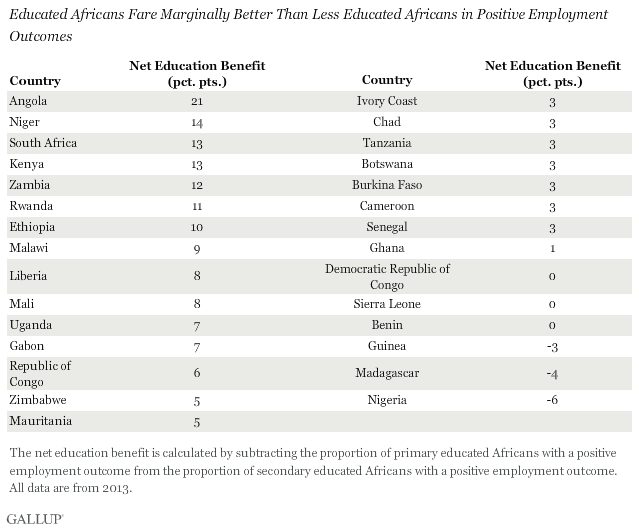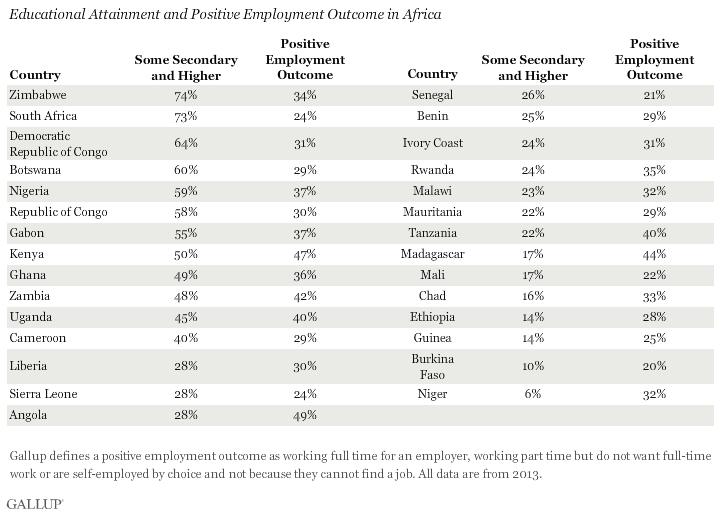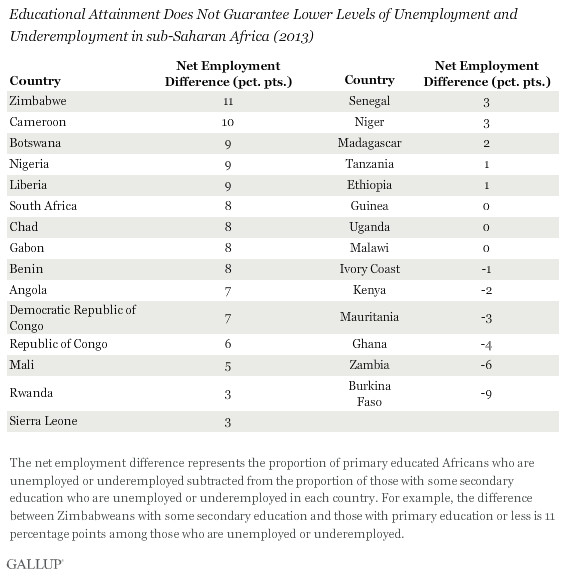Story Highlights
- More education does not guarantee a positive employment outcome
- Structural unemployment threatens sustainable development
WASHINGTON, D.C. -- Africans with more education do not always see an employment benefit from their schooling. In fact, in most of the 29 countries Gallup surveyed in 2013, Africans with at least some secondary education fare only marginally better than Africans with a primary education in terms of a positive employment outcome. Gallup defines a positive employment outcome as working full time for an employer, working part time but not wanting full-time work or being self-employed by choice and not because they cannot find a job.

Angola's high net education benefit likely stems from its oil resources, which have fueled rapid urban development, greater investments in education and the creation of jobs requiring more than primary education. Viewed as a whole, however, these figures paint a dismal, inconsistent picture of the employment reward for continued education in Africa. This situation likely only further fuels the lack of incentive that often exists for Africans to continue their education.
Throughout sub-Saharan Africa, basic needs often compete with a family's ability to send their children to school. While primary education may be viewed as supporting certain occupational activities in rural and urban communities, it is likely that some families do not see the benefit of continued education. And, even if families do, the labor sacrifice makes enrollment beyond primary school infeasible. African families who continue sending their children to school likely do so because they believe it will lead to better jobs.
Educational Attainment Varies Widely
The disparity in educational attainment across sub-Saharan Africa further highlights the region's challenges in achieving universal education. Countries such as Niger and Burkina Faso have lower percentages of their populations achieving at least some secondary education (6% and 10% respectively) while South Africa and Zimbabwe have 73% and 74% of their population with at least some secondary education. Interestingly, while the levels of some secondary education and higher vary significantly between Zimbabwe and Niger, the positive employment outcome is nearly the same.

African Economic Outlook's research regarding education and skills mismatch in the region corroborate Gallup's findings. Their research provides further context by identifying that Africans with more education experience higher levels of unemployment in middle-income countries than in low-income countries.
Regardless of Education, Unemployed and Underemployed Levels Are Similar
The results suggest the levels of unemployment and underemployment in most countries surveyed are similar regardless of Africans' educational attainment, when accounting for the margin of error. This means a family may sacrifice for their child to get more education only to see their child unemployed or underemployed at the same level as someone who only obtained a primary education.

Implications
Developed countries often experience structural unemployment where the persistent mismatch of skills and available jobs requires job seekers to obtain additional education or vocational training. The levels of unemployment and underemployment seen throughout sub-Saharan Africa, however, suggest the mismatch may lie in the lack of opportunities available for those with more education.
African employment opportunities must keep pace with growing levels of secondary and tertiary education achievement. Persistent structural unemployment that penalizes those with higher education creates the conditions for "brain drain" while also creating disincentives for continued education. African governments must seek productive partnerships and investment opportunities that will promote economic growth.
Sub-Saharan Africa's structural unemployment challenges illustrate the complexities of sustainable development. For instance, Nigeria's oil industry funds further investment in education but produces relatively few jobs. In other parts of sub-Saharan Africa, university curriculums prepare graduates for public, not private, sector employment. This focus ensures persistent skills mismatches while also potentially influencing the decisions of multinational corporations seeking to recruit locally.
Education is an important component in addressing sub-Saharan Africa's challenges. However, if Africans do not see higher education leading to better employment opportunities, the region will continue to lose its brightest talents to countries with better economic opportunities. This might be one factor ultimately leading to the region having a diminished voice in determining its own future.
Survey Methods
Results are based on face-to-face interviews with at least 1,000 adults in each country, aged 15 and older, conducted in 2013. For results based on the total sample of national adults, the margin of sampling error ranged from ±3.8 percentage points to ±4.1 percentage points at the 95% confidence level. The margin of error reflects the influence of data weighting. In addition to sampling error, question wording and practical difficulties in conducting surveys can introduce error or bias into the findings of public opinion polls.
Learn more about how the Gallup World Poll works.
For more complete methodology and specific survey dates, please review Gallup's Country Data Set details.

